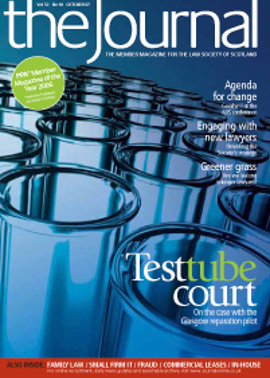A wider view

Test for the Commission
Some of us old-timers remember the days when (apocryphally of course) what happened in the criminal appeal court was that the sentence of the first appellant to have his or her case heard was increased ex proprio motu, leaving the rest of the roll abandoning their appeals like lemmings jumping off a Norwegian clifftop. Well, the scope of appealing in criminal matters is much increased these days, as is evidenced by the case of Raza v Scottish Criminal Cases Review Commission [2007] CSOH 152; 2007 GWD 27-469.
This involved a petition (in the event dismissed by the Lord Ordinary) for judicial review of the Commission’s declining to refer a case to the High Court on the basis that it did not consider that a miscarriage of justice as regards sentence had occurred. Leave to appeal had been refused by judges at the first and second sifts. It was argued that the Commission had misdirected itself by addressing the merits of the case rather than whether there was an arguable appeal on the grounds that sentence was excessive: the use of the word “may” in s 194C(a) of the Criminal Law (Consolidation) (Scotland) Act 1995 demonstrated that the only test was arguability.
In disposing of the judicial review, the Lord Ordinary held that the Commission had acted properly, and in particular identified the Commission’s essential task as being to consider whether or not a miscarriage of justice had occurred. It was pointed out that this could not be equiparated with the task of the sifting judges, who had no discretion to refuse leave to appeal if there were arguable grounds.
Discounting the discount
Innovation in criminal law is usually followed by a spate of activity in the appeal court. In spite of the undoubted skills of parliamentary draftspersons, and indeed of judges setting out new ways of approaching old problems, there always seem to be matters in need of further elucidation. In this spirit we turn to cases about discounting and ASBOs. In the first, Leonard v Houston [2007] HCJAC 46; 2007 GWD 27-473, an appeal against five consecutive sentences amounting to 21 months was refused. The appellant had pleaded guilty to all charges but the sentencing judge had refused to apply a discount, taking the view that the utilitarian benefit of the pleas had been cancelled out by the appellant’s various failures to attend court diets and other appointments.
The appeal court took the view that the sheriff, in the absence of any exculpatory explanation, was entitled to conclude that this lack of co-operation was wilful and that it was thus quite correct to regard the disbenefit as wholly eliding the benefit.
The situation here seems to have been an extreme one in terms of lack of co-operation and subsequent unnecessary public expense and waste of time. It remains to be seen whether courts will be tempted into fine tuning, with a relative lack of subsequent co-operation being (yet) another element in the discount calculation. We would dare to hope not, but as we do we are conscious that one school of thought might suggest that any failure indicated a lack of remorse while the opposing one would say that some things are, relatively, too trivial to bother about.
Unfettered discretion
So far as ASBOs go, I recollect Professor Brian Williams, of Leicester University, whose recent early and tragic death so saddened his many friends and admirers, explaining that they had been widely piloted, extensively researched, universally condemned and accordingly rolled out over the whole country. The latest episode is to be found in Gordon v Griffiths [2007] HCJAC 45; 2007 GWD 26-452. An argument was put forward on behalf of the appellant to the effect that where someone had been charged with a contravention of s 9(1) of the Antisocial Behaviour etc (Scotland) Act 2004 and with a breach of the peace arising out of the same set of facts and circumstances, they could not be competently proceeded against in respect of s 9(1) where the purpose of s 9(3)(b) was to avoid double jeopardy.
The appeal court held that the section had been somewhat carelessly drafted and could be construed in the manner contended for by the appellant, but that in the absence of a clear indication to the contrary it could not be construed as fettering the undoubted discretion of the Crown in regard to matters which were made the subject of court proceedings. It is not clear that the scepticism with which the introduction of ASBOs was greeted has yet been proved to be unfounded.
Unwarranted objection
Brown v Donaldson [2007] HCJAC 40; 2007 GWD 26-453 has certain interesting things to say about search warrants. The petitioner was seeking suspension of a search warrant granted by a justice of the peace in the absence of the clerk to the district court. The argument put forward, and rejected (one supposes without too much difficulty), was that the petitioner’s human rights under article 6 had been breached, in as much as the granting of a warrant was a judicial act and the absence of a clerk gave this the appearance of being other than an independent and impartial tribunal, thus denying the petitioner a fair and impartial hearing.
In refusing the bill, the court pointed out that the decision of a justice under s 23 of the Misuse of Drugs Act 1971 was essentially an administrative act; it was not the decision of a court or the determining of any criminal charge and accordingly article 6 could not apply. Reference was made to Mellors v United Kingdom, App No 34723/97, 21 May 1998, ECHR. It was observed by the court that where it was alleged that a warrant had been obtained irregularly (which was not the case here), the question could be raised at the stage of trial if the Crown sought to rely on evidence recovered under it.
Road traffic penalties
Turning aside into the realms of statute law, and in particular the Road Safety Act 2006, practitioners might like to note that as from 24 September 2007 ss 14, 23-25, 27-33, 41 and 43 are in force. Of these the most important would seem to be the following:
- Section 23 increases the maximum penalty for careless driving to £5,000 (which suggests either something very near dangerous or a millionaire behind the wheel).
- Section 25 provides that where a person is convicted of using a vehicle in a dangerous condition, the offence being within three years of a previous conviction for the same thing, there is obligatory disqualification for not less than six months.
- Sections 27 and 29 respectively increase the maximum fine for failing to stop when required by the police, and the penalty points for failing to provide information about the identity of a driver.
- Section 30 defines in statute for the first time what careless driving is. Asking ourselves how we managed for so many years without this, we note that it is driving that falls below the standard of a competent and careful driver. Anyone who has walked down a Parisian street and noticed bumps on every parked vehicle may pause for thought as to what this actually means.
- Section 32 makes available the possible alternative verdicts of causing death by dangerous driving, dangerous driving and causing death by careless driving when under the influence of drink or drugs, when someone is acquitted on a charge of culpable homicide in a death involving a motor vehicle.
Child support disqualification
Finally, while it is not exactly crime although the sanction is not unlike a criminal one, there is the case of Secretary of State for Work and Pensions v Runciman 2007 GWD 27-470. This was an appeal to the sheriff principal against disqualification from driving for nine months for failure to make child maintenance payments at the required rate. It was held that the sheriff had applied the proper statutory tests in terms of the Child Support Act 1991, and that while the disqualification would cause considerable inconvenience, the appellant did not need a driving licence to earn his living.
In this issue
- Advocacy in mediation
- Your voice will count
- Does justice need fixing?
- A case for trial?
- The tide for change
- New lawyers for all
- Leaving the profession
- Three proposals
- Options ahead on standards
- Know the need, know the cure
- The file at your fingertips
- Fraud: making your strategy work
- A wider view
- Pub games reborn
- Working with OSCR
- Goal to Leeds
- "We're all doomed" - or are we?
- Website reviews
- Book reviews
- Out of my depth?
- Court bars in-house privilege
- Leases: the war is over?
- ARTL picks up speed






